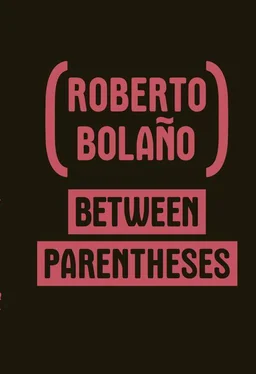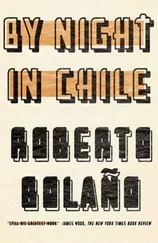Roberto Bolaño - Between Parentheses - Essays, Articles and Speeches, 1998-2003
Здесь есть возможность читать онлайн «Roberto Bolaño - Between Parentheses - Essays, Articles and Speeches, 1998-2003» весь текст электронной книги совершенно бесплатно (целиком полную версию без сокращений). В некоторых случаях можно слушать аудио, скачать через торрент в формате fb2 и присутствует краткое содержание. Год выпуска: 2011, Издательство: New Directions, Жанр: Публицистика, Критика, на английском языке. Описание произведения, (предисловие) а так же отзывы посетителей доступны на портале библиотеки ЛибКат.
- Название:Between Parentheses: Essays, Articles and Speeches, 1998-2003
- Автор:
- Издательство:New Directions
- Жанр:
- Год:2011
- ISBN:нет данных
- Рейтинг книги:4 / 5. Голосов: 1
-
Избранное:Добавить в избранное
- Отзывы:
-
Ваша оценка:
- 80
- 1
- 2
- 3
- 4
- 5
Between Parentheses: Essays, Articles and Speeches, 1998-2003: краткое содержание, описание и аннотация
Предлагаем к чтению аннотацию, описание, краткое содержание или предисловие (зависит от того, что написал сам автор книги «Between Parentheses: Essays, Articles and Speeches, 1998-2003»). Если вы не нашли необходимую информацию о книге — напишите в комментариях, мы постараемся отыскать её.
The Savage Detectives
Between Parenthese
Between Parentheses: Essays, Articles and Speeches, 1998-2003 — читать онлайн бесплатно полную книгу (весь текст) целиком
Ниже представлен текст книги, разбитый по страницам. Система сохранения места последней прочитанной страницы, позволяет с удобством читать онлайн бесплатно книгу «Between Parentheses: Essays, Articles and Speeches, 1998-2003», без необходимости каждый раз заново искать на чём Вы остановились. Поставьте закладку, и сможете в любой момент перейти на страницу, на которой закончили чтение.
Интервал:
Закладка:
What a relief to read Bayly after so many inscrutable or pathetic figures who confuse realism with dogmatism, information with proclamation. What a relief Bayly’s writing is after the interminable lineup of talentless Latin American chest-thumpers, of snobs with their corseted prose, of pontificating bureaucratic heroes of the proletariat. What a relief to read someone who has the narrative will not to avoid almost anything.
Machiavellian Bayly, or naïve Bayly. These words were written a few hours ago, after reading in today’s El País , Thursday March 25, what Bayly said the day before yesterday to the Madrid press, which is that Yo amo a mi mami was a gift for his mother. With gifts like this, one can be assured of making enemies for life. Thank goodness it’s for his mother, although if fifteen years from now my son were to give me a gift like this, I think we’d have a problem. Anyway, it could also be argued that Bayly presents his mother with a portrait of his grandfather, which really is a splendid gift. And ultimately, yes, it can be said that this is a genuine gift for his mother: a true if terrible mirror, a mirror in which the lady from Lima circles, across which she bumps and bounces, all in a frighteningly coherent way, a mirror in which the lady from Lima trembles, lost in limbo but still alive, somehow alive, with all her contradictions and obsessions, her vices and her small virtues, and all thanks to her son, the son, the family idiot.
Bayly’s prose, which I wouldn’t hesitate to call luminous (luminous and brave, though not luminous like the desert or the forest, but luminous like urban afternoons, and not recklessly brave or somberly brave but brave like someone who has to struggle with himself and not lose his happiness), isn’t an isolated phenomenon in Spanish-language literature. Bayly must be read in this context, too: that of a literature in which for the first time novels produced on opposite sides of the Atlantic are, in a certain sense, walking hand in hand. Unlike the group of Boom writers, made up solely of Latin Americans, in the still undefined sphere of the end-of-the-millennium novel there’s room for Spaniards and Latin Americans alike, for example, the work of Enrique Vila-Matas, César Aira, and Javier Marías, a Catalan, an Argentine, and a writer from Madrid, probably the three authors farthest out ahead in the new territory to explore. What is this new territory? The same as it always is, but different, which is a way of saying that I don’t know. Anyway, it’s the territory where the bones of Cervantes and Valle-Inclán lie buried, and it’s the undiscovered territory, the territory of the dead and the territory of adventure. And advancing toward it, I think, are at least ten writers whose books can be called alive, and one of them is Jaime Bayly.
§§ Disforzados — tr.
¶¶ Engreído — tr.
A Stroll Through the Abyss
Of the many novels that have been written about Mexico, the best are probably the English novels and the odd American one. D. H. Lawrence takes a stab at the agonist novel, Graham Greene the moral novel, and Malcolm Lowry the total novel, by which I mean the novel that plunges into chaos (which is itself the subject of the ideal novel) and tries to order it and make it legible. Few contemporary Mexican writers, with the possible exception of Carlos Fuentes and Fernando del Paso, have embarked on such an undertaking, as if they were barred from it from the outset or as if what we call Mexico, which is also a jungle or a desert or a faceless crowd, were a territory reserved solely for foreigners.
Rodrigo Fresán more than fulfills this and other requirements for writing about Mexico. Mantra is a kaleidoscopic novel, shot through with fierce, occasionally over-the-top humor, written in a prose of rare precision that allows itself to oscillate between anthropological document and the delirium of late nights in a city — Mexico City — that superimposes itself on the subterranean cities beneath it like a snake swallowing itself.
The novel, or so it appears (and I say appears because everything in this novel can come to seem only apparent, though its parts are assembled with mathematical exactitude), is divided into three long chapters. The first is narrated by an Argentine boy and takes place in Argentina, upon the arrival at school of a new student, a Mexican boy who goes from potential victim to leader of the group in less than a minute by the clever (and dangerous) trick of playing Russian roulette with a real gun in front of the other students when the teacher leaves them alone. The boy, Martín Mantra, is the ultimate incarnation of the enfant terrible: son of two soap opera actors, he comes to school accompanied by his Mexican bodyguard, a former masked wrestler, and he plans to revolutionize the world of film and television. The novel’s vision of Mexico, the place where this incredible boy comes from, is projected through the boy and the Argentine narrator’s memories of his own childhood, and through something that is never clearly stated but that at times resembles an illness or societal collapse and that may just be the irremediable end of childhood.
The symbolic figure who presides over this first section is a hero of the past, the ( post-mortem ) General Gervasio Vicario Cabrera, a mixed-up Mexican who fought in Argentina’s war of independence and was executed by firing squad, by all accounts too hastily, just as the symbolic figure who presides over the novel’s third part is a robot whose shadow seems to mingle with the first words of Pedro Páramo .
The second chapter — the best, in my opinion — is organized alphabetically, like a dictionary of Mexico City or a dictionary of the abyss. It’s also the longest section of the novel, beginning on page 144 and ending on page 509. It’s open-ended: it can be read linearly or the reader can begin with any letter he wants. The narrator this time is a French man, a man who knows Martín Mantra only by reputation, and who travels to Mexico to kill and be killed. And even to continue killing after death. Among the multiple plotlines that criss-cross like lightning bolts is the story of Joan Vollmer, killed in Mexico City while playing William Tell with her husband, William Burroughs; and the story of the Mexican masked wrestlers and the nouvelle vague film that one of them wants to make in France; and the story of LIM, the international language of the dead; and the story of Mexican monsters and Mexican pornography; and the story of the female rock group Anorexia & The Skinny Chicks; and the story of Martín Mantra as a millenarian and media-savvy guerrilla; and even the love story (though it’s set in Paris) of the French narrator and a Mexican girl.
Words from Mantra selected at random. From the section “Soap Operas,” for example: “Soap operas are like mutant newscasts.” And the section “Television Sets”: “You ask what brand those dead television sets are, the kind the dead watch, and I say [. .] those zombie boxes where zombies feed their eyes to other zombies are Sonbys.” From the section “Vomit”: “That’s how Joan Vollmer talks, and here’s what she says as she chain-smokes invisible cigarettes. She tells me that her cigarettes are a strange brand: some make her speak in the first person and others in the third person, in that choked and spasmodically seismic language that is the International Language of the Dead.”
So the dead speak a language of tremor-like cadences. And Mantra , or so we discover as we progress through the different superimposed layers of the novel, gradually fills up with the dead, all the dead of Mexico, from the eminent to the anonymous. And the tremor that the reader feels is the tremor of LIM, a language that can also be used to write novels so long as they’re organized alphabetically.
Читать дальшеИнтервал:
Закладка:
Похожие книги на «Between Parentheses: Essays, Articles and Speeches, 1998-2003»
Представляем Вашему вниманию похожие книги на «Between Parentheses: Essays, Articles and Speeches, 1998-2003» списком для выбора. Мы отобрали схожую по названию и смыслу литературу в надежде предоставить читателям больше вариантов отыскать новые, интересные, ещё непрочитанные произведения.
Обсуждение, отзывы о книге «Between Parentheses: Essays, Articles and Speeches, 1998-2003» и просто собственные мнения читателей. Оставьте ваши комментарии, напишите, что Вы думаете о произведении, его смысле или главных героях. Укажите что конкретно понравилось, а что нет, и почему Вы так считаете.












